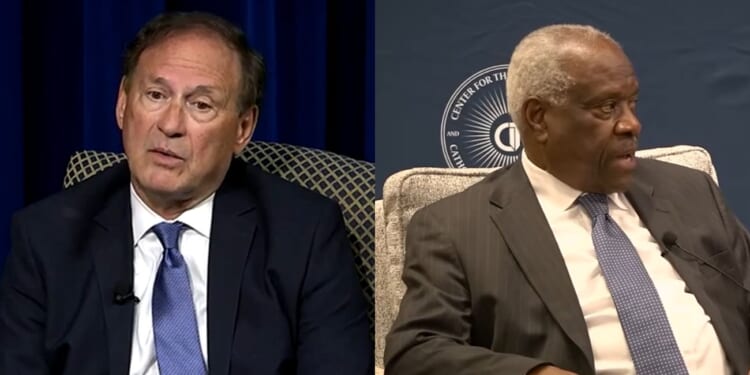Less than five months ago, Associate Justices Samuel Alito and Clarence Thomas warned that the U.S. Supreme Court’s decision in Trump v. CASA, limiting lower courts’ use of nationwide injunctions, failed to address loopholes open to abuse by left-wing activists and judges. And since the handing down of that ruling, the two senior justices have been proven right.
The issue of nationwide injunctions was front and center during a panel discussion at The Federalist Society’s annual National Lawyers Convention this past weekend. Titled, “Judicial Oversight of District Courts After CASA,” the conversation focused on the CASA decision and the ongoing judicial coup aimed at grinding President Trump’s administration to a halt.
While speaking on the panel, Yale Law School Professor E. Garrett West praised the Supreme Court’s CASA decision as “a brilliant vindication of the formalist argument that says universal injunctions are totally impermissible” under America’s constitutional framework. However, he noted, “the bad news is that it practically will make almost no difference with respect to the functional problems created by the universal injunction.”
“The reason it will make probably no difference at all or hardly any difference at all is because there are so many alternative mechanisms for plaintiffs who are motivated to get something like a universal injunction to go get one,” West said.
West went on to highlight several of these key loopholes, including the issue of class action certification. As described by the Yale Law School professor, “[I]f there are enough of the [class] members, they can ask for complete relief from a particular court, and the injunction might be basically just as broad as it would have been if it had been a universal injunction.”
West also noted the issue of associational standing, wherein “nonprofits can bring claims on behalf of their members asserting injuries to their members, and if they have enough members, it might be broad enough that the injunction is effectively a universal injunction.” He also raised the question of claims by state governments, in which states that are suing the federal government and alleging “some kind of financial injury … come up with a theory for why it’s the case that the court has to completely enjoin the policy to give complete relief to the states.”
As previously alluded to, this isn’t the first time such problems have been raised. In fact, Alito and Thomas underscored many of these same issues in a concurring opinion the former authored in the Supreme Court’s CASA decision.
While joining the court’s majority opinion, Alito (joined by Thomas) wrote separately “to note two related issues that are left unresolved and potentially threaten the practical significance of today’s decision: the availability of third-party standing and class certification.”
“Today’s decision only underscores the need for rigorous and evenhanded enforcement of third-party-standing limitations. The Court holds today that injunctive relief should generally extend only to the suing plaintiff,” Alito wrote. “That will have the salutary effect of bringing an end to the practice of runaway ‘universal’ injunctions, but it leaves other questions unanswered.”
The George W. Bush appointee posed a hypothetical question about what would happen if a state were to be granted third-party standing in a suit, and whether any prospective injunctive relief would extend to “all residents of that State.” If such a standard were to be applied, he reasoned, then states would become emboldened to “bring third-party suits on behalf of their residents” to obtain broader “relief than any individual resident could procure in his own suit.”
“Left unchecked, the practice of reflexive state third-party standing will undermine today’s decision as a practical matter,” Alito wrote.
Addressing the issue of class certification, Alito predicted that the court’s decision would “have very little value if district courts award relief to broadly defined classes without following ‘Rule 23’s procedural protections’ for class certification.” (Under the Federal Rules of Civil Procedure, Rule 23 lists the specific factors federal courts examine when deciding whether to grant class certification in any case.)
[READ: The Supreme Court Killed Universal Injunctions In Name Only]
It didn’t take long after CASA‘s release for Alito and Thomas’ worries to materialize. As Ted Frank, director at the Hamilton Lincoln Law Institute and the Center for Class Action Fairness, noted during The Federalist Society panel discussion, “in the four months since CASA, there has not been a single court that has denied class certification when deciding to issue universal relief.”
The Federalist’s Brianna Lyman previously reported how, days after the court’s decision went public, an Obama-appointed district judge “sided with the left-wing ACLU and several other activist[] organizations when he ruled that President Donald Trump exceeded his authority when he issued an executive order on Jan. 20 prohibiting illegal aliens who ‘engaged in the invasion across the southern border’ from seeking asylum or a withholding of removal.” The D.C.-based judge notably “granted plaintiffs’ request to certify a class of migrants who … were either subject to Trump’s proclamation heard by the court or would be subject to it in the future,” according to Fox News.
Also in the days following the Supreme Court’s CASA ruling, a New Hampshire-based district court judge certified a nationwide class in an ACLU-backed challenge to Trump’s birthright citizenship order and issued a preliminary injunction in the case. In September, a different district judge from New York granted class certification in a lawsuit over the living conditions of an ICE holding facility and similarly issued a preliminary injunction attempting to manage its use.
While a couple of this weekend’s panelists seemed to defend rogue district court judges or critique the Supreme Court for siding with the Trump administration in brief emergency docket rulings, former Trump Justice Department Chief of Staff Chad Mizelle highlighted the overwhelming abuse of nationwide injunctions by lower court judges. He specifically noted the alarming discrepancy between the number of injunctions issued against Trump and his recent predecessors.
“[President George W.] Bush had six injunctions against him. Half of those were issued by Democrat-appointed judges. [President Barack] Obama had 12 nationwide injunctions issued against his administration. Sixty percent of those were issued by Republican-appointed judges,” Mizelle said. “In the first Trump term, he had 64 injunctions. That compares with [President Joe] Biden’s 14. And then before the CASA decision, we have a rough count of about 40 issued in the first six months of the [second] Trump administration. So, over a hundred injunctions issued … against the Trump administration.”
Mizelle went on to echo similar findings previously published by Federalist Senior Contributor Ben Weingarten in a RealClearInvestigations analysis. Mizelle noted how “over 90 percent” of the injunctions against the Trump administration “were issued by Democrat-appointed judges,” and assessed that “since 1963, over three-quarters of the nationwide injunctions have been issued against President Trump, with over 90 percent of those coming from Democrat-appointed judges.”
“Well, some might argue that’s just because Trump is more lawless. Well, again, let’s look at the facts,” Mizelle said. “Twenty-four emergency petitions were filed at the Supreme Court by the Trump administration this year. They won 22 of them. That’s a 92 percent win-rate at the United States Supreme Court. There’s not a single other entity that comes anywhere close to that.”
Shawn Fleetwood is a staff writer for The Federalist and a graduate of the University of Mary Washington. He previously served as a state content writer for Convention of States Action and his work has been featured in numerous outlets, including RealClearPolitics, RealClearHealth, and Conservative Review. Follow him on Twitter @ShawnFleetwood

















